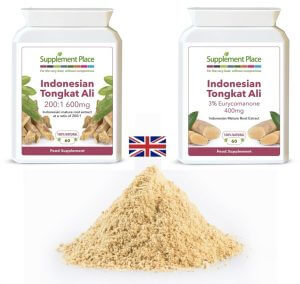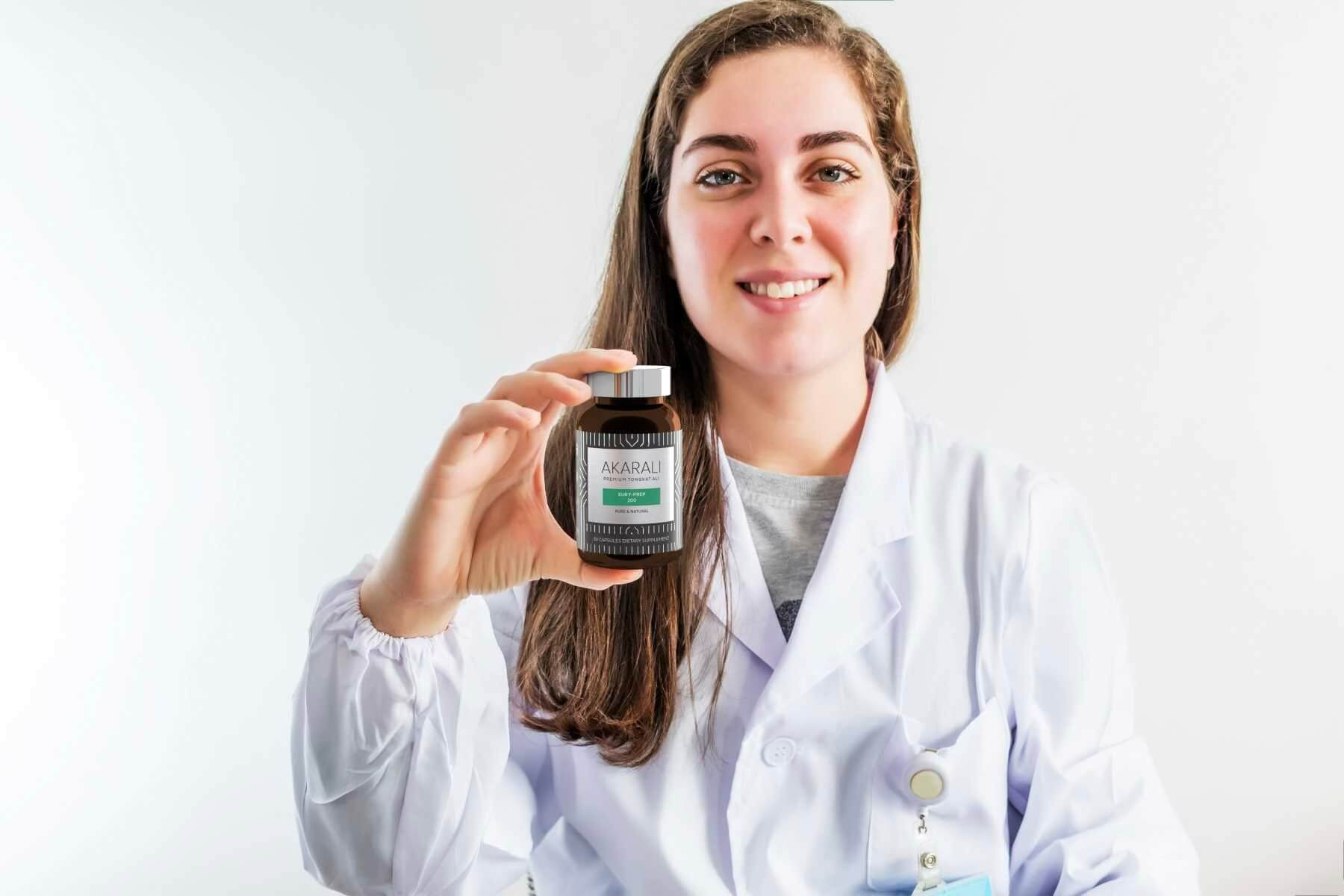

In the world of hormone optimization therapies, hormonal supplements such as Tongkat Ali and TRT are two known popular solutions for women, highly regarded by professionals that potentially help to regulate overall hormonal balance – notably testosterone, cortisol and estrogen.
We turn to experts to understand if women should take Tongkat Ali as a hormonal or testosterone supplement as an option to TRT. This guide is dedicated to women to understand how hormonal supplement impacts health, well-being and potentially prevent premature aging symptoms.
In the pursuit of optimal hormonal balance, women often turn to natural supplements to address various health concerns associated with testosterone, estrogen, energy, and stamina. Tongkat Ali (Eurycoma longifolia), a plant traditionally used to enhance testosterone production in men, has gained attention for its potential benefits for women in recent years.
While its effects on male testosterone levels are well-documented, there is growing interest in its ability to support female hormonal health.
Women, particularly those experiencing hormonal imbalances due to age, stress, pregnancy, alcohol-abuse or other underlying symptoms, may find Tongkat Ali a helpful supplement to be incorporated as part of your health stack, or overall wellness plan.
However, this should be treated with caution.
Before diving into supplementation of Tongkat Ali, it’s crucial to understand how Tongkat Ali interacts with female hormone regulation, testosterone levels, energy, and overall well-being.
This may help you decide whether Tongkat Ali should be taken daily, or as-and-when needed (eg: before your exercises, training or when you are stressed).
Hormonal imbalances in women can result from a variety of causes, including age-related changes, stress, poor diet, and medical conditions. These imbalances which may occur in mid-aged women above 30, may manifest in symptoms like weight gain, fatigue, mood swings, and diminished libido.
Estrogen dominance, a condition where estrogen levels are too high relative to other hormones, is a common issue, particularly during perimenopause – but TRT may not be the best solution when estrogen levels are too high.
Conversely, testosterone levels, though much lower in women than men, are also vital for overall health, affecting muscle mass, bone density, and sexual function.
As women age, particularly during menopause, testosterone production declines and fluctuate easily with high variance based on external factors such as stress, leading to muscle weakness, decreased libido, mood-swings that affect cognition and focus, and more importantly a profound loss of stamina when performing physical activities such as running.
Dr. Jolene Brighten, a functional medicine naturopathic doctor, emphasizes that low testosterone in women can lead to symptoms such as low energy, fatigue, muscle weakness, and infertility.
Supplementation with Tongkat Ali, which has been shown to promote testosterone production, may be an effective natural remedy to help women regain energy, restore libido, and maintain muscle strength during this phase of life.
Ultramarathon female runner Mira Ambu takes Tongkat Ali during 60km races with improved endurance and energy levels. At 33, she benefitted from Tongkat Ali supplementation to increase endurance for marathon races, enabling better hormonal balance throughout longer distance.

“I take Tongkat Ali 200mg as needed during training and before races. I felt lighter on my feet when running and I depend less on energy gels” she added.
She believes that optimizing testosterone levels from natural supplements is deemed particularly important for women; where exercise-induced hypogonadism (i.e low testosterone) is an inherent issue experienced by many female endurance athletes that affects athletic performance and health.
This underscores the importance of Tongkat Ali in supporting both testosterone and estrogen levels for women, and how it translates into measurable or noticeable benefits by optimizing hormonal health for recreational athletes, active women and possibly for female with sedentary lifestyle too.
Tongkat Ali is a natural adaptogen that supports the body’s endogenous testosterone production, primarily through its effects on the hypothalamic-pituitary-gonadal axis, which regulates hormone secretion.
For women, the ability to enhance testosterone levels naturally may have far-reaching implications. While testosterone is commonly associated with male health, it plays an essential role in women’s well-being, contributing to muscle strength, bone density, and sexual function.
Some research suggests that Tongkat Ali can balance testosterone levels without significantly affecting estrogen—a delicate balance that is crucial for women’s hormonal health.
Unlike synthetic testosterone or testosterone replacement therapy (TRT), Tongkat Ali does not artificially elevate testosterone levels but instead helps restore them to more optimal levels. This may alleviate the symptoms of testosterone deficiency in women, such as low libido, fatigue, and muscle loss.
Moreover, Tongkat Ali’s impact on testosterone may also help address issues related to estrogen dominance, as the increase in testosterone may counterbalance the excess estrogen. This hormonal equilibrium is essential in preventing the negative effects of estrogen imbalances, such as weight gain, mood swings, and increased risk of bone density loss.
One of the most notable benefits of Tongkat Ali is its ability to improve energy levels and stamina, both of which are often compromised by hormonal imbalances.
Women who experience chronic fatigue or adrenal fatigue due to stress, poor sleep, or hormonal fluctuations can benefit from Tongkat Ali’s adaptogenic properties. The herb helps regulate cortisol—a stress hormone—by enhancing the body’s stress response, which in turn promotes better energy production.
Tongkat Ali has also shown potential in improving muscle endurance and overall stamina. As women age, the decline in testosterone can result in a loss of muscle mass, strength, and physical endurance.
By stimulating natural testosterone production, Tongkat Ali may support muscle growth and prevent the fatigue that often accompanies hormonal decline. For women looking to enhance their physical stamina and reduce fatigue, Tongkat Ali could provide a natural, safe option to boost their performance without relying on synthetic stimulants.
As women age, particularly after menopause, their estrogen levels decrease, leading to an increased risk of osteoporosis and other bone health issues.
While Tongkat Ali primarily affects testosterone levels, its ability to support testosterone production could also indirectly benefit bone health.
Testosterone is essential for maintaining bone density, and its decline during menopause contributes to bone fragility. By helping to restore testosterone levels, Tongkat Ali may play a role in maintaining bone strength and reducing the risk of osteoporosis in postmenopausal women.
Though Tongkat Ali does not directly replace estrogen, it may serve as a complementary supplement in a broader approach to managing hormonal changes and supporting bone density. Its role in testosterone metabolism could help preserve muscle mass and bone strength, key factors in maintaining overall health during and after menopause.
As with any supplement, Tongkat Ali is not without its potential side effects, although they are generally considered mild when taken at recommended doses. The most commonly reported side effects include:
Because Tongkat Ali affects hormone levels, it is recommended that women with hormone-sensitive conditions, such as estrogen-positive breast cancer or endometriosis, consult their healthcare provider before using the supplement.
Additionally, long-term safety data on Tongkat Ali for women is limited, so it’s advisable to monitor any changes in health while using it, although it is generally safe to consume 200mg daily if you are above 30 or if you are been actively exercising.
In conclusion, Tongkat Ali offers significant potential for women looking to support testosterone levels, improve energy, and enhance stamina. By helping to balance testosterone and estrogen, it can alleviate common symptoms of hormonal imbalances, including fatigue, low libido, and muscle loss.
While Tongkat Ali shows early positive changes, it is essential for women to approach supplementation with caution, particularly if they have hormone-sensitive conditions.
As with any supplement, consulting with a healthcare provider before starting a Tongkat Ali regimen is crucial, especially for those seeking to address specific health concerns related to hormonal imbalances.
With further research, we will likely see more definitive evidence regarding Tongkat Ali’s long-term safety and efficacy for women’s health, but its current profile positions it as a valuable natural supplement for supporting hormonal and overall wellness.
References

Alex Kua leads AKARALI’s Global Partnership Community to help athletes, sports communities, and thousand of others optimize their well-being through evidence-based research that enables them to make better informed decisions. His legal and business consulting background underpins the rigorous data-driven approach in his writing – from hours of interviews, real-world performance data, and firsthand experiences of real people – offering actionable insights that connects clinical research, emerging health trends, and real-world applications. He is also an experienced researcher in herbal nutrition, with years of deep technical knowledge on Tongkat Ali (Eurycoma longifolia), including quality standards, industry benchmarks, lab tests, clinical trials, and the use of natural herbs by collaborating with top scientists, herbal experts, and nutritionists. As part of the core team behind AKARALI’s knowledge portal, he empowers people worldwide to access the benefits of high-quality herbal nutrition in a way that is effective, sustainable, and safe. He is also an avid runner, with regular participation in local sports communities and running events.
Our articles are third party reviewed by our panel of experts and medical advisors to ensure the facts are accurate and credible. These are validated against multiple source references which include but not limited to research studies, peer-reviewed journals, pre-clinical studies, clinical tests and other credible publications.
Our panel of medical advisors and experts are highly experienced in their individual fields. However, they do not provide any medical advice or recommendations arising from content published in this article.
Disclaimer:
The content published on this website is for educational purposes and should not be viewed, read, or seen as a prescription or constitute any form of medical advice. We recommend you consult your nearest GP or doctors before consuming Tongkat Ali or any products which contain Tongkat Ali. For further information, kindly refer to our Frequently Asked Questions (FAQ) for more information.